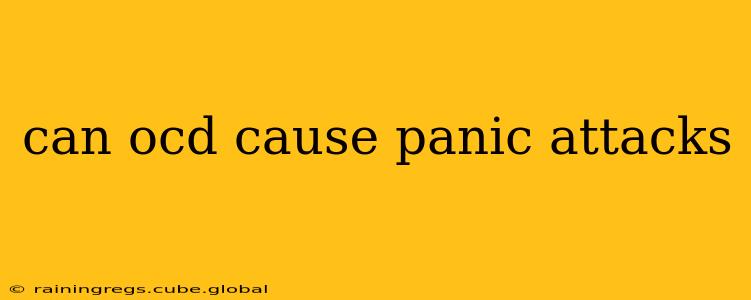Obsessive-compulsive disorder (OCD) and panic attacks often coexist, leading many to wonder about their relationship. While OCD doesn't directly cause panic attacks in the sense of being a biological trigger, the intense anxiety and distress associated with OCD can significantly increase the likelihood of experiencing them. Let's delve into this complex relationship.
What is OCD?
OCD is a mental health condition characterized by intrusive, unwanted thoughts (obsessions) that create significant anxiety. Individuals with OCD often engage in repetitive behaviors or mental acts (compulsions) to reduce this anxiety. These compulsions, while providing temporary relief, ultimately reinforce the obsessive thoughts, perpetuating the cycle. Common obsessions include fears of contamination, harm to oneself or others, symmetry, and unwanted sexual thoughts. Compulsions can range from excessive handwashing to repeatedly checking locks or arranging objects.
What are Panic Attacks?
Panic attacks are sudden episodes of intense fear that peak within minutes. Symptoms can include a racing heart, shortness of breath, trembling, sweating, chest pain, nausea, dizziness, and a feeling of impending doom. While anyone can experience a panic attack, individuals with anxiety disorders are at a much higher risk.
How are OCD and Panic Attacks Connected?
The connection between OCD and panic attacks is multifaceted:
-
Anxiety as a Shared Element: Both OCD and panic attacks stem from heightened anxiety. The overwhelming anxiety generated by obsessive thoughts in OCD can easily trigger a panic response. The fear and uncertainty inherent in OCD create a fertile ground for panic attacks to occur.
-
The Cycle of Anxiety: The cycle of obsessions and compulsions in OCD can become incredibly stressful. The constant worry, the need to perform rituals, and the fear of things going wrong can lead to a build-up of anxiety that culminates in a panic attack.
-
Misinterpretation of Physical Symptoms: The physical symptoms associated with anxiety, such as a racing heart or shortness of breath, can be misinterpreted by individuals with OCD as signs of a serious medical problem or impending catastrophe. This misinterpretation can fuel anxiety and potentially trigger a panic attack.
-
Comorbidity: OCD and panic disorder frequently co-occur, meaning individuals often experience both conditions simultaneously. This comorbidity highlights the shared underlying mechanisms of anxiety and the interconnected nature of these disorders.
Does everyone with OCD experience panic attacks?
No, not everyone with OCD experiences panic attacks. The severity of OCD, the presence of other anxiety disorders, and individual coping mechanisms all play a role in whether or not panic attacks develop.
Can treatment for OCD help with panic attacks?
Yes, often treatment approaches that address the underlying anxiety in OCD also alleviate panic attacks. Cognitive Behavioral Therapy (CBT), particularly exposure and response prevention (ERP), is a highly effective treatment for both OCD and panic disorder. This therapy helps individuals gradually confront their fears and anxieties, breaking the cycle of obsessions and compulsions while building coping skills for managing panic. Medication, such as selective serotonin reuptake inhibitors (SSRIs), can also be helpful in managing both conditions.
What should I do if I experience panic attacks related to OCD?
If you're experiencing panic attacks related to your OCD, it’s crucial to seek professional help. A mental health professional can provide a proper diagnosis, develop a personalized treatment plan, and offer support and guidance. Remember, you are not alone, and effective treatments are available.
This information is for educational purposes only and should not be considered medical advice. If you are concerned about your mental health, please consult a qualified healthcare professional.
